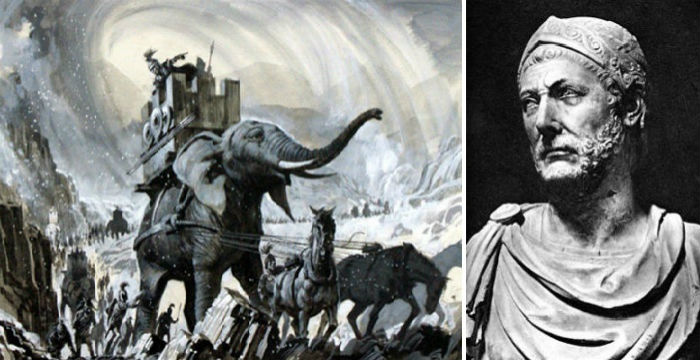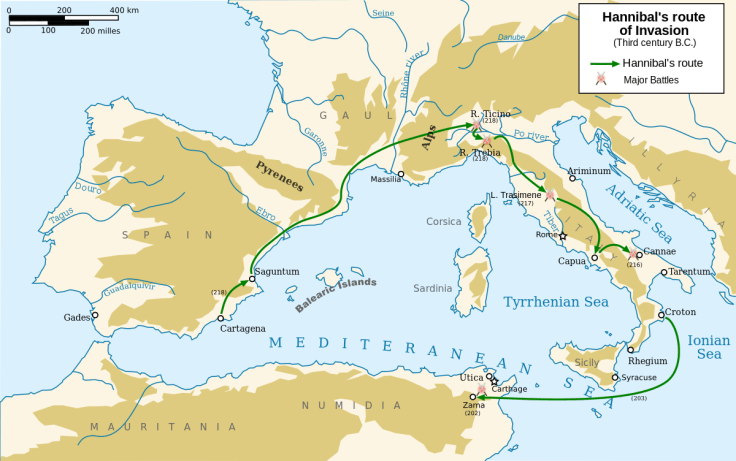Hannibal, who was wintering in New Carthage, in the first place dismissed the Iberians to their own cities hoping thus to make them readily disposed to help in the future; next he instructed his brother Hasdrubal how to manage the government of Spain and prepare to resist the Romans if he himself happened to be absent; in the third place he took precautions for the security of Africa, adopting the very sensible and wise policy of sending soldiers from Africa to Spain, and vice versa, binding by this measure the two provinces to reciprocal loyalty.

The troops who crossed to Africa were supplied by the Thersitae, Mastiani, Iberian Oretes and Olcades, and numbered twelve hundred horse and thirteen thousand eight hundred and fifty foot, besides which there were eight hundred and seventy Balearians, a popular appellation, derived from ballein, “to throw,” and meaning slingers, given to them owing to their skill with this weapon and extended to their nation and islands. He stationed most of these troops at Metagonia in Libya and some in Carthage itself. From the so-called Metagonian towns he sent four thousand foot to Carthage to serve both as a reinforcement and as hostages. In Spain he left with his brother Hasdrubal fifty quinqueremes, two tetraremes, and five triremes, thirty-two of the quinqueremes and all the triremes being fully manned. He also gave him as cavalry Liby-Phoenicians and Libyans to the number of four hundred and fifty, three hundred Ilergetes and eighteen hundred Numidians drawn from the Masylii, Masaesylii, Maccoei and Maurusi, who dwell by the ocean, and as infantry eleven thousand eight hundred and fifty Libyans, three hundred Ligurians, and five hundred Balearians, as well as twenty-one elephants.
Hannibal, after taking all precautions for the safety of Africa and Spain, was anxiously awaiting the arrival of the messengers he expected from the Celts. He had informed himself accurately about the fertility of the land at the foot of the Alps and near the river Po, the denseness of its population, the bravery of the men in war, and above all their hatred of Rome ever since that former war with the Romans. He therefore cherished high hopes of them, and was careful to send messengers with unlimited promises to the Celtic chiefs both on this side of the Alps and in the mountains themselves, thinking that the only means of carrying the war against the Romans into Italy was, after surmounting, if possible, the difficulties of the route, to reach the above country and employ the Celts as co-operators and confederates in his enterprise. When the messengers arrived and reported that the Celts consented and awaited him, at the same time saying that the crossing of the Alps was very toilsome and difficult, but by no means impossible, he drew out his troops from their winter quarters in the early spring. As the news (218 BC) of what had happened in Carthage had just reached him, his spirits were now high, and trusting in the favourable disposition of the citizens, he now called openly on his men to join him in the war against Rome, impressing upon them the demand of the Romans that he and all his principal officers should be given up to them, and pointing out at the same time the wealth of the country they were bound for and the friendly feelings of the Gauls who would be their allies. When he saw that the soldiers listened gladly and were as eager as himself to be off, he commended their alacrity and after ordering them to be ready on the day fixed for his departure, dismissed the meeting.

Having completed the arrangements during the winter and thus assured the security of Africa and Spain, he advanced on the day he had fixed with an army of about ninety thousand foot and twelve thousand horse. Crossing the Ebro, he set about subduing the tribes of the Ilurgetes, Bargusii, Aerenosii, and Andosini as far as the Pyrenees, and having reduced them all and taken some cities by assault, with unexpected rapidity indeed, but after many severe engagements and with great loss, he left Hanno in command of all the country on this side of the river, placing the Bargusii under his absolute rule, as he mistrusted them most, owing to their friendly sentiments toward Rome. He assigned to Hanno out of his own army ten thousand foot and one thousand horse, and he left with him all the heavy baggage of the expeditionary force. He dismissed at the same time an equal number of troops to their homes, with the view of leaving them well disposed to himself and encouraging the hope of a safe return in the rest of the Spaniards, not only those who were serving with him, but those who remained at home, so that if he ever had to call on them for reinforcements, they might all readily respond. With the rest of his force, thus lightened of its impedimenta and consisting now of fifty thousand foot and about nine thousand horse, he advanced through the Pyrenees towards the crossing of the Rhone, having now an army not so strong in number as serviceable and highly trained owing to the unbroken series of wars in Spain.
At the time of which we are speaking the Carthaginians were masters of all that part of Africa which looks towards the Mediterranean from the Altars of Philaenus on the Greater Syrtis as far as the Pillars of Hercules. The length of this coast-line is more than sixteen thousand stades. Crossing the straits at the Pillars of Hercules they had similarly subdued all Iberia as far as the point on the coast of the Mediterranean where the Pyrenees, which separate the Celts from the Iberians, end. This spot is about eight thousand stades distant from the mouth of this sea at the Pillars of Hercules, the distance being three thousand stades from the Pillars to New Carthage, from which place Hannibal started for Italy, two thousand six hundred stades from hence to the Ebro, and from the Ebro to Emporium one thousand six hundred stades. From Emporium to Narbo it is about six hundred stades, and from Narbo to the passage of the Rhone about sixteen hundred, this part of the road having now been carefully measured by the Romans and marked with milestones at every eighth stade. From the passage of the Rhone, following the bank of the river in the direction of its source as far as the foot of the pass across the Alps to Italy, the distance is fourteen hundred stades, and the length of the actual pass which would bring Hannibal down into the plain of the Po, about twelve hundred. So that to arrive there he had, starting from New Carthage, to march about nine thousand stades.
(Source: Polybius, The Histories, Vol.II, Book III, Loeb Classical Library)
 Pyrenees
Pyrenees
Research-Selection for NovoScriptorium: Anastasius Philoponus

Leave a comment